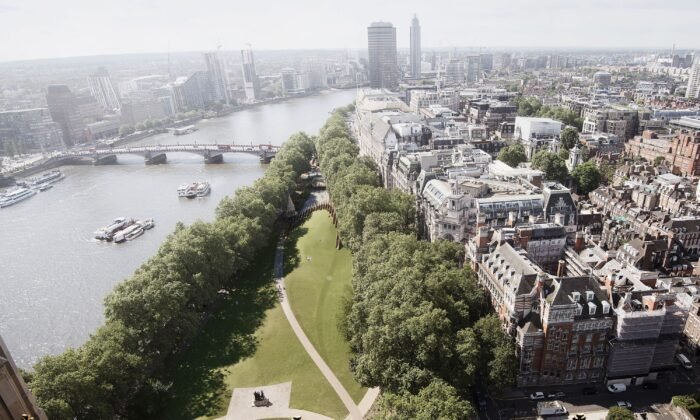Labour proposes new legislation for the construction of Holocaust Memorial in Westminster
The National Holocaust Memorial is slated to be located in Victoria Tower Gardens, adjacent to Westminster Abbey and the Palace of Westminster.
A Holocaust memorial is set to be erected in the heart of Westminster, pending parliamentary approval of legislation that was reintroduced by the Labour government on Thursday.
The construction of the National Holocaust Memorial in Victoria Tower Gardens is limited by existing Victorian legislation. However, the project can move forward if the House of Lords approves the Holocaust Memorial Bill reintroduced by the Labour party.
Deputy Prime Minister Angela Rayner stated that the legislation will allow future generations to “learn lessons from the past and contribute to building a more united, tolerant future.”
“The atrocities of the Holocaust serve as a solemn reminder of the consequences of unchecked hatred and intolerance. It is crucial that we ensure the memory of those who perished is never forgotten,” Ms. Rayner remarked.
The Bill
Initially proposed in 2014, the project received planning consent from the then-housing minister Chris Pincher in July 2021.
London Historic Parks and Gardens Trust challenged this decision in the High Court, citing the requirement of the London County Council (Improvements) Act 1900 for Victoria Tower Gardens to be utilized as a public park.
The Holocaust Memorial Bill aims to eliminate the limitations set forth in the 1900 act, allowing construction to proceed.
The bill will also authorize spending on the upkeep and operation of the memorial and learning center.
The subterranean learning center of the memorial will serve as a “place for solemn reflection and a space to comprehend the history of the Holocaust and extract lessons for the future,” according to the government.
Jewish Community
The Jewish Leadership Council (JLC) embraced the government’s support for the bill, stating that the memorial will serve as a pivotal site for Holocaust education.
The chief executive of the Holocaust Educational Trust, Karen Pollock, highlighted the increase in anti-Semitism in the UK and globally.
“As the Holocaust moves further into the past and survivors grow fewer and weaker, the urgency to make progress on constructing the memorial and learning center next to Parliament has never been greater,” Ms. Pollock emphasized.
Another member of the Jewish community, Chief Rabbi Sir Ephraim Mirvis, welcomed the reintroduction of the bill in Parliament.
“Given the passage of time and the surge of polarization, scapegoating, and hatred prevalent in the world, the vital moral obligation to preserve the lessons of the Holocaust cannot be emphasized enough,” Sir Ephraim remarked.
The Peers
Having been debated in the previous Parliament, the bill will proceed through the Commons without a debate. It will then undergo examination by the Lords.
Ms. Rayner urged the House of Lords to pass the legislation and mirror the cross-party unity demonstrated in the Commons in approving the bill.
The veteran former MP for Brentwood—now Lord Pickles—expressed his delight at the advancement of the memorial project.
Baroness Ruth Deech, who has previously criticized the project, is expected to oppose the bill in the House of Lords. She has previously stated that a Holocaust memorial is unlikely to combat anti-Semitism.
“Approximately £75 million has been allocated for the memorial, with current estimates exceeding £100 million. If resources are available for Holocaust remembrance, the focus should be on enhanced education, interactions with survivors, the preservation of their memories, and understanding the link between anti-Semitism and the establishment of Israel,” Baroness Deech wrote in a 2019 article for The House magazine.
In 2023, the projected total cost of the project increased to £138.8 million.





